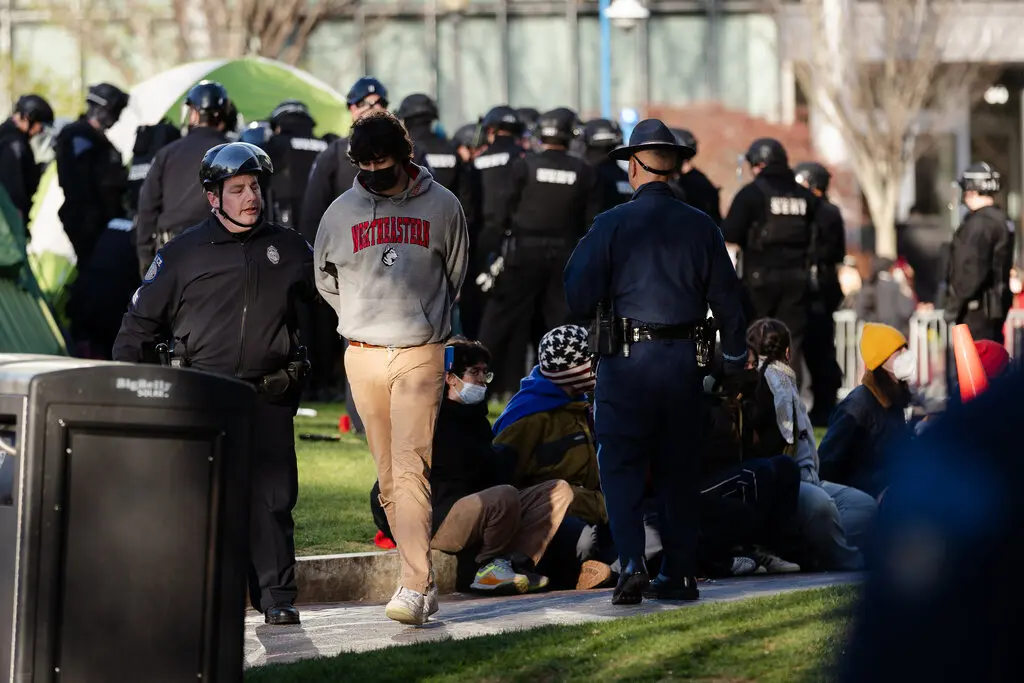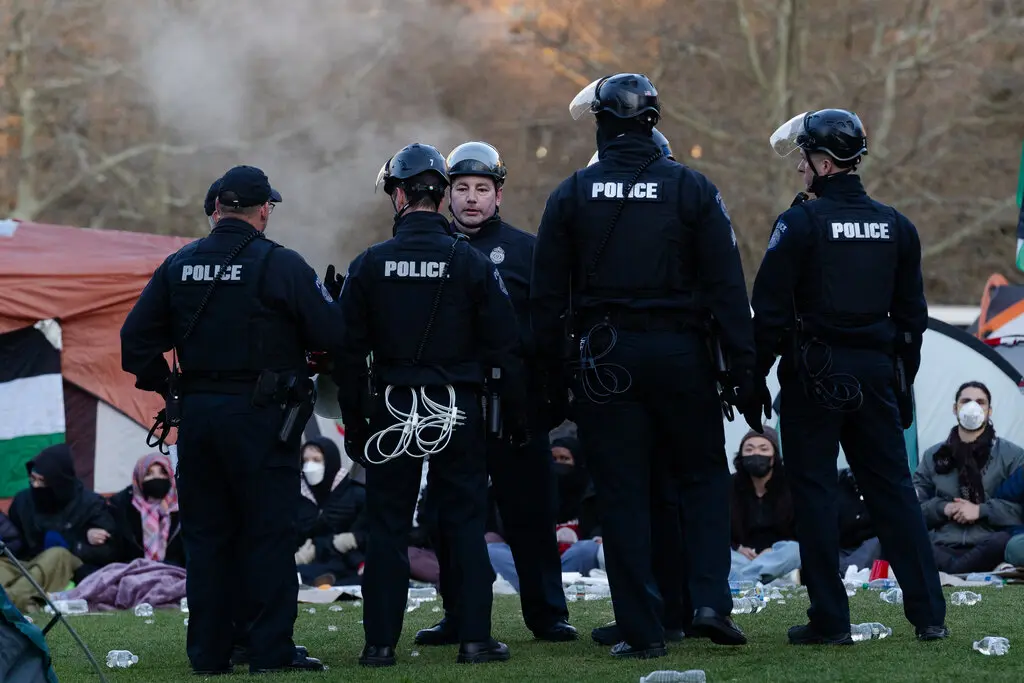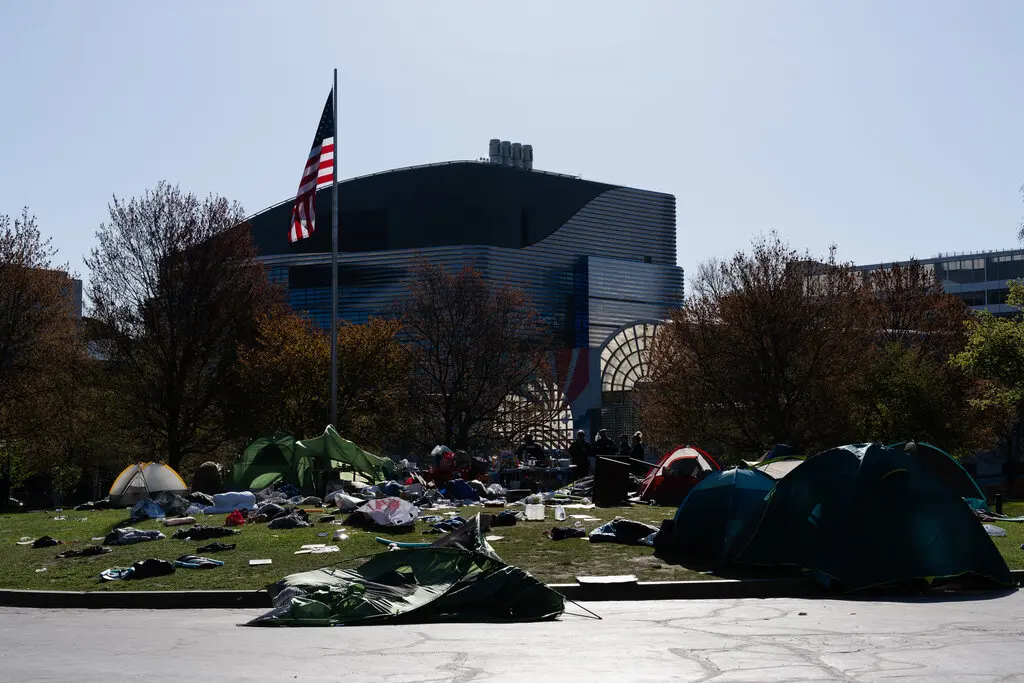On Saturday, authorities arrested students from Northeastern University, Arizona State University, and Indiana University as more institutions converged on Gaza protest encampments.

Nearly 200 protestors were arrested on Saturday at Northeastern University, Arizona State University, and Indiana University, according to officials, as colleges around the country fight to control escalating pro-Palestinian demonstrations and encampments on campus.
More than 700 protesters have been arrested on US campuses since April 18, when Columbia University requested that the New York Police Department dismantle a protest encampment. In several cases, the majority of people detained were released.
This week, protesters at Northeastern University in Boston established a campsite on the campus’s Centennial Common, drawing more than 100 sympathizers. The administration urged the protesters to leave, but several students refused.
Around dawn on Saturday, Massachusetts State Police officers arrived at the encampment and began arresting protesters, putting them in zip-tie handcuffs and removing many tents. They stated that they had arrested 102 demonstrators. It was unclear how many of those arrested were students, but the institution stated that students who showed their university IDs would be released.

Renata Nyul, a Northeastern spokesman, claimed that the demonstration was “infiltrated by professional organizers” and that the “use of virulent antisemitic slurs, including ‘Kill the Jews,’ crossed the line.”
Protestors refuted both accusations, and a video appeared to show a pro-Israel counterprotester using the phrase to criticize the pro-Palestinian protestors’ chants. In reaction to the video, Ms. Nyul reiterated her previous remarks, saying, “Any suggestion that repulsive, antisemitic comments are sometimes acceptable depending on the context is reprehensible.”
After the police removed protestors from the campsite, handcuffed them, and took them to a neighboring building, they moved to block an alley where police vehicles were stationed. They clapped in solidarity as one of the arrested protestors, dressed in a Northeastern sweatshirt, waved through the building’s windows with zip-tied hands.

Alina Caudle, a sophomore at Northeastern University, restated the protesters’ requests that the university reveal its interests and divest from corporations that they believe support Israel’s conflict in Gaza.
“We want them to divest our money that we’re paying for our tuition,” she stated. “Our administration is not listening to us.”
Ms. Caudle stated that she believed the vast majority of students in the campground were Northeastern students, as well as a significant number of Jewish students and professors who supported the protest.
By 11 a.m. on Saturday, the majority of the encampment had been evacuated. A moving firm had been hired to load up the tents, refreshments, and other goods that had been dispersed around the grounds.
The mass arrest at Northeastern was the second early-morning takedown on demonstrators on a Boston college in less than a week. Early Thursday morning, Boston Police officers arrested 118 people at Emerson College after demonstrators refused to leave and built a blockade.
More than 2,500 miles away, at Arizona State University, 69 people were arrested early Saturday morning for establishing an unauthorized encampment, which was against university policy, according to school officials.
According to the school, the demonstrators formed an encampment and were repeatedly instructed to disperse.
“While the university will continue to be an environment that embraces freedom of speech, ASU’s first priority is to create a safe and secure environment that supports teaching and learning,” the institution stated in a statement.
According to officials, three people were arrested at the school following a demonstration on Friday.
On Saturday, campus and state police detained 23 more protestors at Indiana University Bloomington, where university police had arrested 33 people during an encampment. According to officials, a group “erected numerous tents and canopies on Friday night with the stated intention of occupying the university space indefinitely.”
On Saturday, Washington University in St. Louis was closed down due to protests, and multiple arrests were made, according to campus police and updates on the university’s website. It was not immediately apparent how many people had been arrested.
Over the last week, schools around the country have adopted a differing strategies to combat protests. Some have backed down and attempted to de-escalate tensions, while at other campuses, such as the University of Southern California and Emory University, police have rushed in to tear up encampments and arrest students and staff members, among other things.
There have been reports of injuries at certain gatherings, but the arrests have mostly been peaceful, and demonstrators have frequently freely surrendered when cops arrived.
On Saturday, there appeared to be an enhanced police presence on various campuses, but not all of them made arrests. At the University of Pennsylvania, more than a dozen campus police officers were stationed at barricades, beside over 100 protesters in an encampment and about a dozen pro-Israel counterprotesters across the campus walkway.
Officers were stationed throughout the now-closed campus of California State Polytechnic University, Humboldt, after demonstrators occupied two buildings earlier this week. There were about three dozen demonstrators inside an encampment.
Aside from arrests, schools are utilizing other methods to create pressure. At Harvard, admission to the ancient Harvard Yard was restricted to those with a university ID. The university also suspended a pro-Palestinian group, but the group and its supporters set up camp in the yard anyhow.
On Saturday, Harvard’s dean of students wrote an email to all students warning them that anyone who participated in the campsite would face disciplinary action. But there was no indication of an approaching police action.
The Cornell Daily Sun, Cornell University’s student newspaper, reported on Friday that four students involved in the pro-Palestinian campsite on campus had been suspended. Cornell authorities acknowledged the suspensions, but did not disclose a specific number.
In a statement issued Saturday afternoon, Joel M. Malina, the university’s vice president for university relations, stated that the school had asked the protesters to relocate to an area “where noise would not disturb classes” and where people could easily avoid the encampment, but that offer was turned down.
Mr. Malina further stated that the university was ready to impose additional bans, “as well as referrals to HR for employee participants.”
Nick Wilson, a student who claimed to be among those suspended, stated in an opinion article for The Cornell Daily Sun that he and others had been withdrawn from their present classes and were not permitted on campus. Nonetheless, he stated that the suspension “in an odd way” offered him hope. According to his argument, schools like Cornell would not have suspended him and others “unless they truly fear our movement may succeed.”
